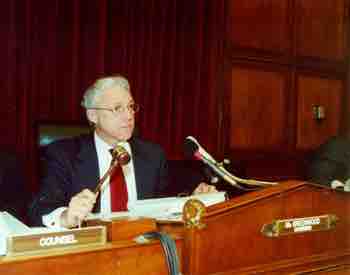Background
Congressional oversight refers to oversight by the United States Congress of the Executive Branch, including the numerous U.S. federal agencies. Congressional oversight is the review, monitoring, and supervision of federal agencies, programs, activities, and policy implementation. Congress exercises this power largely through its congressional committee system. However, oversight, which dates to the earliest days of the Republic, also occurs in a wide variety of congressional activities and contexts. These include authorization, appropriations, investigative, and legislative hearings by standing committees; specialized investigations by select committees; and reviews and studies by congressional support agencies and staff.
Congress's oversight authority derives from its "implied" powers in the Constitution, public laws, and House and Senate rules. It is an integral part of the American system of checks and balances.
Report on the Organization of Congress
Oversight is an implied rather than an enumerated power under the U.S. Constitution. The government's charter does not explicitly grant Congress the authority to conduct inquiries or investigations of the executive, to have access to records or materials held by the executive, or to issue subpoenas for documents or testimony from the executive.
There was little discussion of the power to oversee, review, or investigate executive activity at the Constitutional Convention of 1787 or later in the Federalist Papers, which argued in favor of ratification of the Constitution. The lack of debate was because oversight and its attendant authority were seen as an inherent power of representative assemblies, which enacted public law.
Oversight also derives from the many, varied express powers of the Congress in the Constitution. It is implied in the legislature's authority, among other powers and duties, to appropriate funds, enact laws, raise and support armies, provide for a Navy, declare war, and impeach and remove from office the President, Vice President, and other civil officers. Congress could not reasonably or responsibly exercise these powers without knowing what the executive was doing; how programs were being administered, by whom, and at what cost; and whether officials were obeying the law and complying with legislative intent.
The Supreme Court of the United States made the oversight powers of Congress legitimate, subject to constitutional safeguards for civil liberties, on several occasions. For instance, in 1927 the High Court found that in investigating the administration of the Justice Department, Congress was considering a subject "on which legislation could be had or would be materially aided by the information which the investigation was calculated to elicit. "
Activities and Avenues
Oversight occurs through a wide variety of congressional activities and avenues. Some of the most publicized are the comparatively rare investigations by select committees into major scandals or executive branch operations gone awry. Examples are temporary select committee inquiries into: China's acquisition of U.S. nuclear weapons information, in 1999; the Iran-Contra affair, in 1987; intelligence agency abuses, in 1975-1976, and "Watergate," in 1973-1974. The precedent for this kind of oversight goes back two centuries: in 1792, a special House committee investigated the defeat of an Army force by confederated Indian tribes.

Jim Greenwood Committee Chair
Congressman Jim Greenwood, Chairman of the House Committee on Energy and Commerce Subcommittee on Oversight and Investigations, gavels to start the hearing on human cloning.